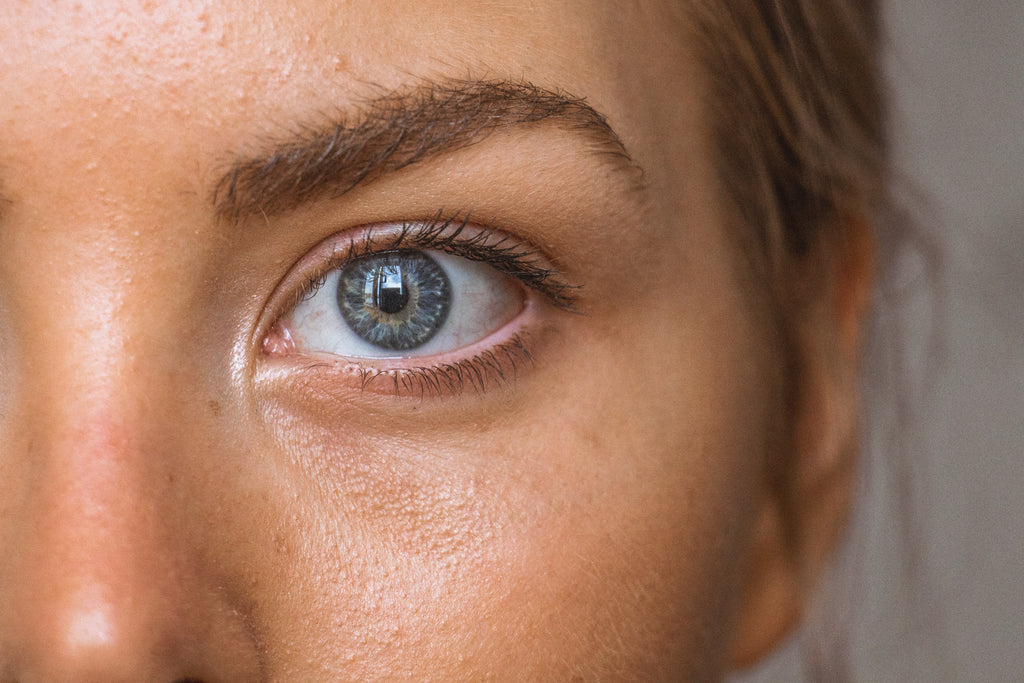What causes dry skin on the face?

Dry skin, especially on the face, can make even the happiest of us feel miserable. Looking in the mirror and seeing patches of dry, flaky skin can really damage our self-esteem, making us feel anxious and self-conscious, so what can we do to prevent it?
Finding the cause of the dry skin on your face is the first steps to improving it and preventing it from coming back. There are many causes of dry skin, from autoimmune skin diseases like eczema, to poor diet and lifestyle choices. Once you have determined the cause of your dry skin, which may be multiple, you can start to make changes which will lead towards improved skin health resulting in a happier, more confident you.
10 Causes of Dry Skin on the Face
- Stress
Stress can play a huge part in your overall health, including your skin. It can suppress your immune system, upset your digestive and reproductive systems and often plays a huge part in problems such as headaches, high blood pressure, heart problems, diabetes, skin conditions, asthma, depression and anxiety.
If you already suffer with a skin condition, such as eczema, stress is very likely to trigger a flare up. This, in turn, frustratingly leads to more stress, another flare up and so on. It is a difficult cycle to break.
Consider taking regular time out to relax and do what helps you to unwind. Spending time with friends, taking long walks in nature and regular exercise are all proven to lower stress levels.

- Environment
Cold temperatures with low-humidity and strong winds can really dry out your skin. If you’re not the outdoorsy type and stay inside to take shelter from the cold weather, this could also be a cause of your dry skin. When rooms are heated with wood-burners, central heating, fireplaces or space heaters, moisture is removed from the air which can dry the delicate skin on your face out.
Likewise, if you’re in very hot temperatures and often take shelter from the sun in airconditioned spaces for long periods, such as at work or at home, this could also dry your skin out as it sucks moisture from the air.
- Hot showers and hot baths
Similar to sunburn, hot water causes damage to the keratin cells in your epidermis (the most outer layer of your skin). This prevents the cells from having the ability to lock in moisture and creates dry, damaged skin.
We’re not suggesting you take cold showers, though they do have some incredible health benefits! Instead, try to dial down the temperature a few notches at a time. Gradually, you’ll become more accustomed to cooler showers and learn to love them as much as your damaging hot showers. Your skin will thank you for it.
- Skincare Products
If you were to list all of the products, including make-up, that you’re using regularly on your face, how many are there? Exfoliators, cleansers, toners, moisturisers, eye creams, UV protection, primers, concealers, foundation, powders, etc. It’s a lot, right?
Whilst all these products, when purchased responsibly, are wonderful and can actually prevent dry skin, you do need to tailor your skincare routine to suit your specific skin type.
If you’re prone to suffering with dry skin, we wouldn’t recommend using all these products regularly. In fact, it could be that one or more of these products is actually causing the irritations. Check how many ingredients are in each product, sometimes all it takes in an intolerance to one of those ingredients to cause an imbalance in skin moisture.
Consider cutting right back on your skincare routine, using products with the least amount of ingredients. A bit of trial and error may detect whether any of your current products are the culprit of your dry skin outbreak.
- Household Products
We’ve covered the obvious – products that you purposely apply to your skin. But what about other products that you regularly, and sometimes unknowingly, come into contact with? Your household cleaners may contain harsh chemicals that could be transferred to your face either through the air or by touching your face after using them.
Other fragranced products such as air fresheners, incense sticks and scented candles can also irritate your skin. Try removing all fragranced household products for a couple of weeks and see if it has any impact on your skin.

- Perfume
Having your skin come into contact with a substance it doesn’t agree with can irritate and cause dry skin. Perfumes often contain toxic chemicals which are damaging to health, both internal and external.
People with sensitive skin are often mildly allergic to their perfume, without ever knowing. Ditch the body fragrances for several months to see whether that makes a difference to your skin.
- Not using moisturiser
If you’re suffering with a bout of dry skin, we’ll assume you are already applying a moisturiser. Whilst this is recommended, it’s vital that you are using one that is suitable for your skin. What may work wonders for your friend could provide the opposite results for you and end in more damage to your skin.
Not using a moisturiser at all? It’s time to start. Whether you have dry skin or not, you should be moisturising.
Look for a moisturiser that is specifically made for dry and sensitive skin.
- Diet
Reflect on your diet and whether that could be a factor in your dry skin. Are you drinking enough water? The Eatwell Guide recommends 6-8 cups of fluid a day. Whilst they state that low-fat milk and sugar free drinks such as tea and coffee all count, we strongly advise sticking with pure water for those with dry skin. Staying well hydrated has a hugely positive impact on your skin as well as your overall health.
Alongside drinking plenty of water, it’s vital to get a varied and balanced diet, with lots of fruit and vegetables. The vitamins and minerals in fresh produce are great for promoting healthy skin.

- Lifestyle
If you’re a smoker, stop. Nicotine has been shown to impair overall blood flow by causing the narrowing of blood vessels. This in turn leads to dry, dull skin as well as premature aging, wrinkle development, scarring and pigmentation and darkening of the lips. With all the other health implications that go along with smoking, now is a great time to kick the habit for good.
Alcohol is another offender when it comes to drying out the skin. Drinking too much alcohol dehydrates and damages skin. It strips the skin of its natural oils which can leave skin dry and flaky. It also causes flushing of the cheeks that can lead to permanent damage and redness.
- Autoimmune Disease
Unfortunately, dry skin can simply be from an autoimmune disease such as eczema. Eczema, or atopic dermatitis, is a common skin condition causing the skin to become dry, patchy, itchy, and sore. Some people experience only small patches occasionally, whilst others suffer from long term, widespread inflamed skin all over the body.
If you have been diagnosed with a skin condition, such as eczema, all is not lost. You can still try the above remedies to help reduce dry skin on the face. You may discover some triggers that can be avoided in future, helping you to keep flare ups under control.
Speak with your doctor or a dermatologist if you’re suffering with a flare up and are unable to manage it. They can prescribe you with a treatment to suit your skin and monitor the results.
Good lifestyle choices, limiting contact with artificial products and a gentle skincare routine can help your skin stay hydrated and stop it from drying out. It may take some time to find the causes of your dry skin and what works best for you but stick with it, it will be worth it in the end.

Leave a comment